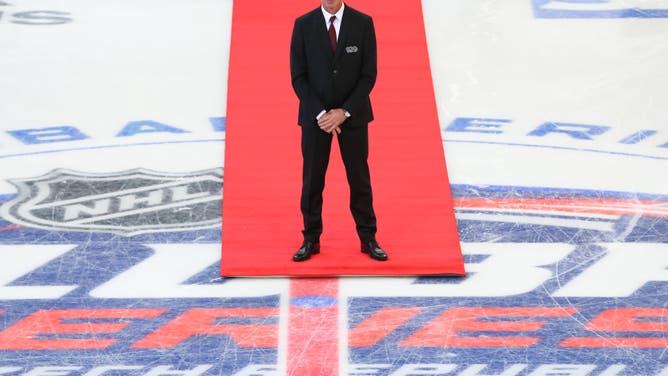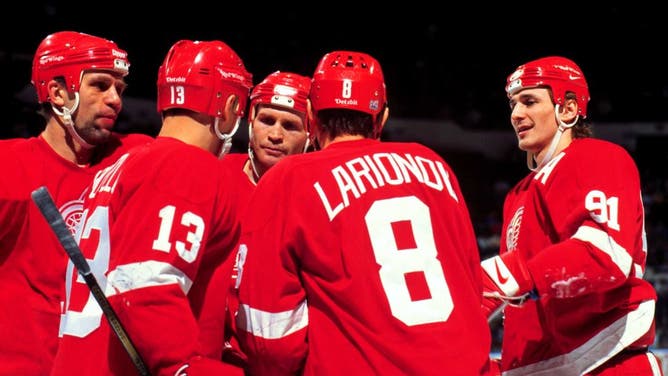Russian Players Not Welcome For NHL Game In Prague, But Should Be
The NHL Global Series is back for 2022 with the San Jose Sharks and Nashville Predators opening their season in Prague, Czech Republic.
It's the first time the NHL has held Global Series games since 2019 due to the COVID pandemic. But now the league has geo-political issues to contend with.
According to the Associated Press, Czech Deputy Foreign Minister Martin Smolek said in a statement that his nation had informed the NHL that they will not issue visas to Russian players.
“We can confirm that the Czech Foreign Ministry has sent a letter to the NHL to point out that, at this moment, the Czech Republic or any other state in the (visa-free) Schengen zone should not issue visas to the Russian players to enter our territory,” Smolek said.
The Czechs reported told the NHL that there are also efforts to ban players who have already received visas.
However, the AP reported that NHL Deputy Commissioner Bill Daly said that he has "no concern." Daly was also mum on whether the league had responded to the letter from the Czech Republic.
Both the Predators and Sharks have Russian players on their rosters. The Predators have forward Yakov Trenin who posted 24 points in 80 games last season.
Meanwhile, the Sharks have two Russian-born players on the books: forward Evgeny Svechnikov and defenseman Nikolai Knyzhov. However, Knyzhov is recovering from surgery and will miss the start of the season.

Legendary NHL netminder Dominik Hasek drops the puck before the 2019 NHL Global Series game between the Philadelphia Flyers and Chicago Blackhawks in Prague. (Getty Images)
Is Keeping Russian Players Out Of The Czech Republic The Right Thing To Do?
One of the biggest hockey names to come out of the Czech Republic, goalie Dominik Hasek, has voiced his support for this type of ban.
Earlier this week, Hasek was reported to have tweeted (in Czech), "Yes, we don’t want any promotion of the Russian aggression here.”
I have nothing for respect for the Dominator. The guy is an absolute legend, but I've got to disagree here.
I will admit that I'm seeing this through an American lens, but it doesn't seem to me like allowing Russian players on American hockey teams to play in their country will serve as "promotion of the Russian aggression."
I think, if anything, it would do the opposite.
Russia has never been fond of losing its best players to North America, and that goes back to the days of the Soviet Union. Just ask guys like Alexander Mogilny or the Detroit Red Wings Russian Five — Sergei Fedorov, Vladimir Konstantinov, Slava Kozlov, Slava Fetisov, and Igor Larionov — who had to defect to play in the NHL.
Yeah, the Russians really wanted them to stay at home.

The Red Wings' "Russian Five" had to defect from their home country to play hockey at the highest level. (Getty Images)
Letting Them Play Highlights The Issues With Russia
Just this offseason, Russian goalie Ivan Fedotov signed a deal with the Philadelphia Flyers. He was drafted into the Russian military before he had a chance to travel to the U.S. Some reports indicate that he has since signed a contract in the KHL, though that has been denied by the team alleged to have signed him, CSKA Moscow.
Fun Fact: CSKA Moscow is the Red Army Team that you always hear about from the Cold War era.
Russian athletes leaving their country to play at the pinnacle of the sport — because it's not in Russia — does the exact opposite of promoting Russia or its ideas.
It underscores the idea that Russia is short on opportunities and paints the nation in an even worst light (if you can believe that). Sure, it's just one game, but it doesn't seem right to punish players for something their country decided to do.
Additionally, to my knowledge, none of the players in question have spoken in support of Russia's actions.
Let them travel with their teams and let them suit play. As NHL Commissioner Gary Bettman said earlier this year, Russian players “are performing in the NHL for their NHL team for NHL fans.”
They're not playing to promote their government's agenda.
Follow on Twitter: @Matt_Reigle